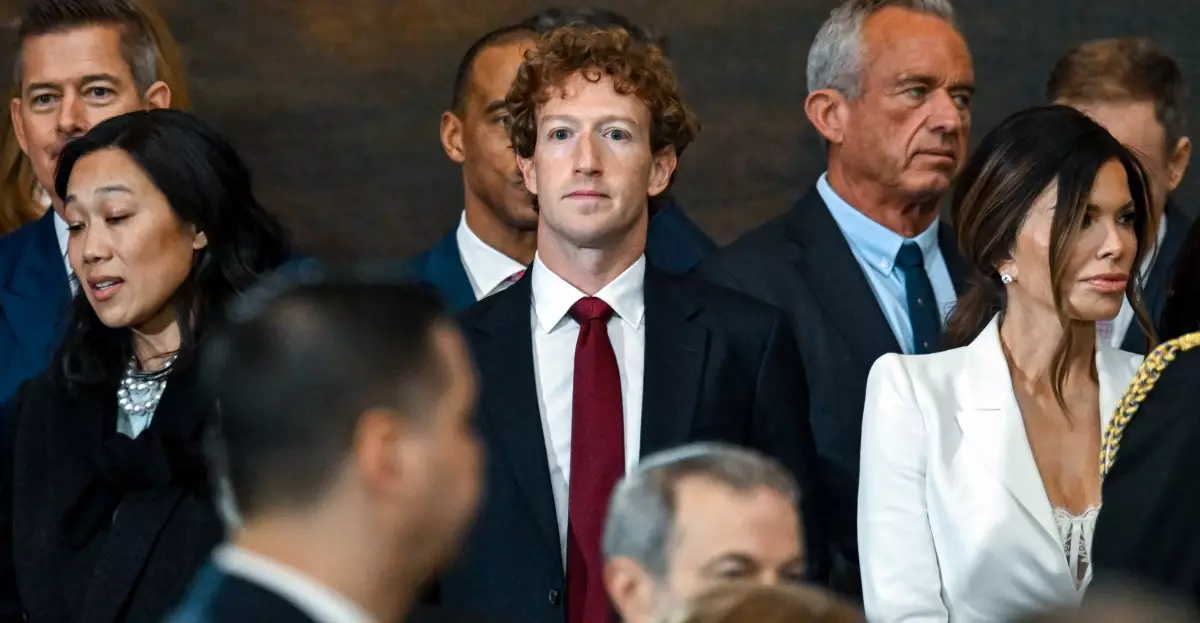In the convoluted world of technology regulation, few narratives are as intricate and revealing as the one surrounding Meta’s co-founder Mark Zuckerberg. In light of the impending European Union (EU) fines against Meta, specifically targeting its controversial “pay or consent” advertising strategy, Zuckerberg’s labyrinthine network of alliances — particularly with political figures like former President Donald Trump — has begun to emerge. This alliance-building may very well be a strategic maneuver aimed at safeguarding his corporation as it faces scrutiny from regulatory watchdogs outside the United States.
The Digital Markets Act (DMA) seems poised to inflict financial penalties on Meta, which could amount to as much as ten percent of its annual earnings, translating into a staggering $16 billion based on projected figures. These fines are not merely monetary warnings; they represent a fundamental clash between European regulatory standards and American business practices. It is an ideological battleground, where Zuckerberg’s approach to navigating these waters raises critical questions about power dynamics in the digital age.
Trump, Money, and Influence
Zuckerberg has demonstrated a marked shift in strategy by cozying up to figures like Trump. This relationship has allowed him to potentially mitigate the consequences of European regulations. By donating a hefty $1 million to Trump’s inauguration fund and visiting Trump’s Mar-a-Lago estate, Zuckerberg seems to be leveraging his resources to cultivate alliances that could offer protection against external threats. Such actions suggest a calculated gamble: tapping into the political machinations of the Trump era may afford Zuckerberg influence, enabling him to push back against intensifying regulatory pressures.
The implications of this approach extend beyond a mere financial transaction or political support; it reflects a burgeoning oligarchic culture within the tech industry. Zuckerberg is not alone in this. Other tech luminaries have followed suit, creating an ecosystem where wealth and political influence intertwine to reshape policy landscapes in their favor. This coalition of powerful tech leaders has raised eyebrows, drawing attention to the ethical considerations of manipulating political avenues for corporate gain.
The Regulatory Tug-of-War
The EU’s impending decision — set against the backdrop of Zuckerberg’s overtures to U.S. political figures — underscores a vital point in the discourse surrounding data privacy and antitrust regulations. American tech giants are facing a growing backlash from European legislators who are keen to uphold consumer protection and fair market practices. Zuckerberg’s rhetoric illustrates a defiant stance, labeling these regulatory efforts as “institutionalizing censorship.” The language he employs reveals an intention to reframe the narrative around oversight and accountability, casting himself as a victim of overreach.
Meta’s precarious position beckons further examination. On one hand, the company stands to lose a substantial market presence in Europe should it fail to comply with new regulations. On the other hand, Zuckerberg’s tactical collaboration with U.S. officials — including directives to Meta executives to engage trade representatives — underscores a desperate bid to shift the balance in his favor. In February, Zuckerberg’s appeal to Washington for assistance not only reflects the urgency of the situation but also speaks volumes about the increasingly blurred lines between corporate governance and political advocacy.
The Consequences of Corporate Power
Zuckerberg’s strategy, while exemplifying a powerful maneuver in the tech industry, raises fundamental questions about accountability and ethical governance. As Meta seeks to navigate the emerging threat of fines, the broader implications of a corporate leader harnessing political relationships to stave off regulatory penalties echo throughout the public conscience. Is this a sustainable model for tech governance, or does it signal a troubling trend where corporate interests overshadow democratic accountability?
The EU’s anticipated decision will expose the cracks in these alliances and provide a litmus test for how effectively political protectionism and corporate power can interact within a globalized economy. As the situation evolves, observers will inevitably scrutinize both the effectiveness of Zuckerberg’s flattery and the implications for future regulatory landscapes. The real question remains — will the blending of politics and corporate interests remain an effective shield for Zuckerberg, or will it ultimately lead to a broader reckoning for Tech Giants in a world demanding greater transparency and accountability?


Leave a Reply